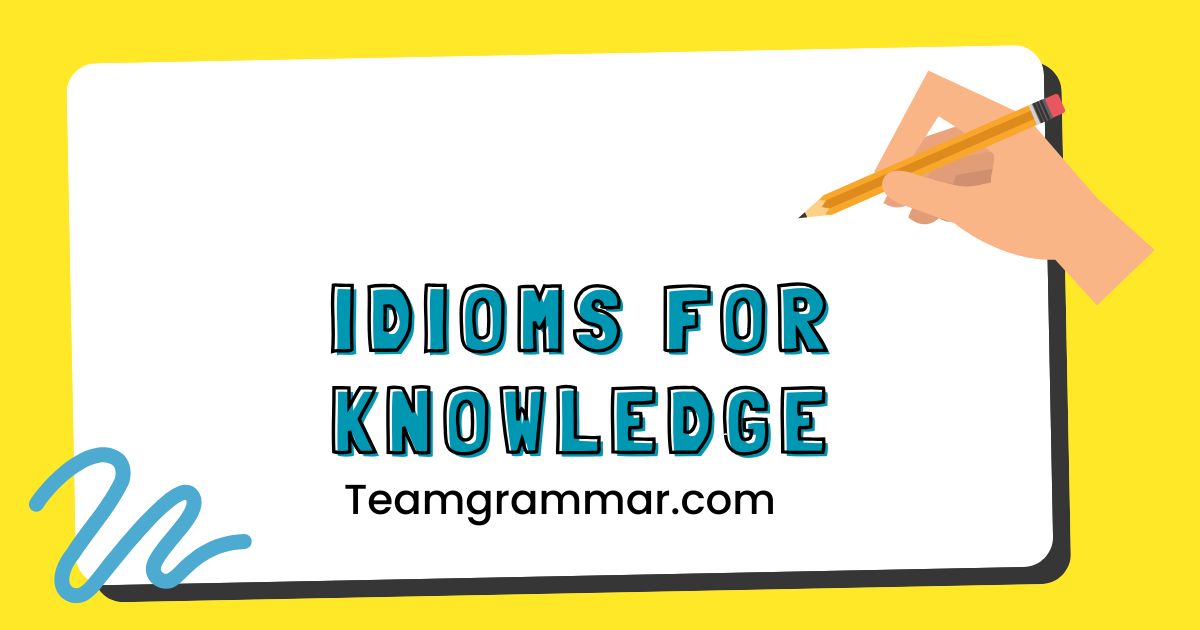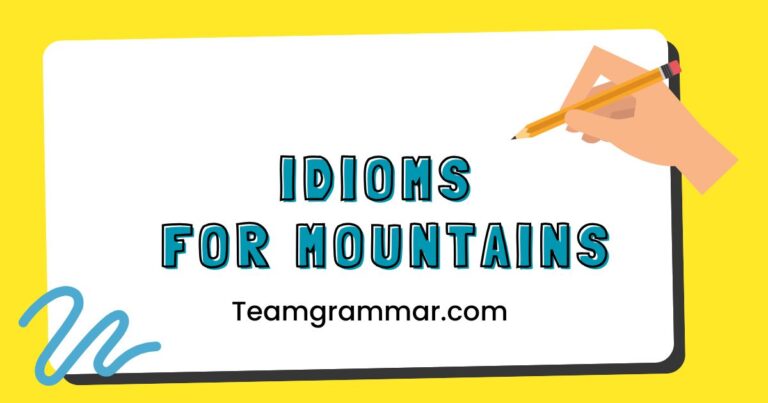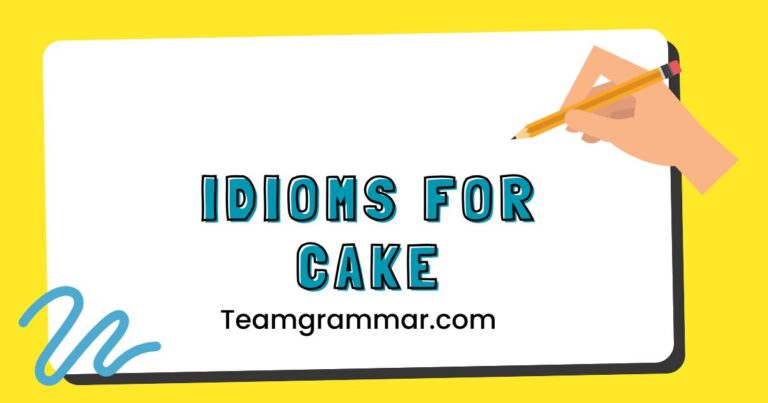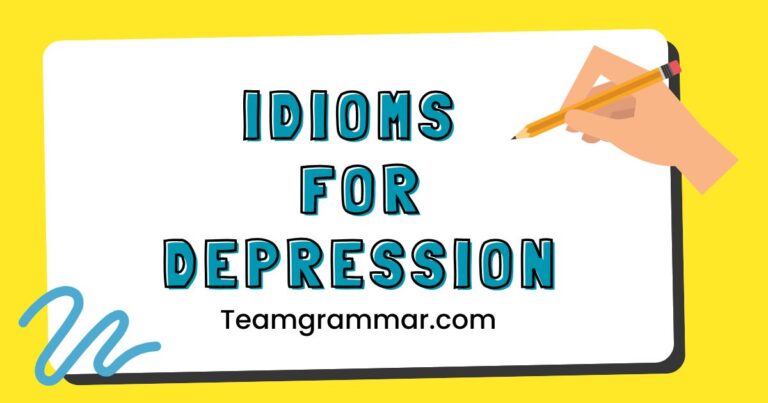39 Idioms for Knowledge: Mastering Figurative Language
Idioms are colorful expressions that add depth and nuance to the English language. Understanding idioms related to knowledge is crucial for effective communication and comprehension.
These idioms often convey complex ideas in a concise and memorable way. This article will explore a wide range of idioms about knowledge, their meanings, origins, and how to use them correctly.
It will benefit English language learners, teachers, and anyone interested in enhancing their vocabulary and understanding of idiomatic expressions.
Table of Contents
- Introduction
- Definition of Idioms for Knowledge
- Structural Breakdown of Idioms
- Types and Categories of Knowledge Idioms
- Examples of Idioms for Knowledge
- Usage Rules for Idioms
- Common Mistakes with Idioms
- Practice Exercises
- Advanced Topics in Idioms
- Frequently Asked Questions
- Conclusion
Definition of Idioms for Knowledge
Anidiomis a phrase or expression whose meaning cannot be understood from the literal meanings of its individual words. Instead, the idiom has a figurative meaning that is known through common usage.
Idioms related to knowledge specifically refer to expressions that describe understanding, learning, intelligence, wisdom, ignorance, or the process of acquiring information.
These idioms often use metaphors, similes, or other figures of speech to convey their meaning. Understanding these idioms is essential for interpreting spoken and written English effectively.
They add color and expressiveness to language, allowing speakers and writers to communicate complex ideas in a concise and memorable way.
Idioms can be classified based on their function. Some idioms act as nouns, verbs, adjectives, or adverbs, depending on how they are used in a sentence.
The context in which an idiom is used also plays a crucial role in determining its meaning. For example, the idiom “hit the books” means to study hard, but its literal meaning has nothing to do with physical contact or literature.
Structural Breakdown of Idioms
Idioms, by their very nature, defy standard grammatical rules. They are fixed expressions, meaning that their structure and wording cannot be altered without losing their idiomatic meaning.
Understanding the structural elements of idioms involves recognizing their fixed nature and the figurative language they employ.
Many idioms are based on metaphorical comparisons. For example, “to be a walking encyclopedia” compares a person’s extensive knowledge to the comprehensive content of an encyclopedia.
Other idioms use similes, which involve explicit comparisons using words like “like” or “as.” For instance, “as clear as a bell” describes something that is easily understood.
The structure of an idiom can also involve common grammatical patterns, such as verb phrases, prepositional phrases, or clauses. However, the meaning of the idiom is not derived from the grammatical structure alone.
It is the combination of words and their established figurative meaning that makes an idiom unique.
Here are some common structural elements found in idioms:
- Verb + Object: E.g., “hit the books” (study hard)
- Prepositional Phrase: E.g., “in the know” (having inside information)
- Adjective + Noun: E.g., “a grey area” (something unclear or undefined)
- Clause: E.g., “to know something like the back of your hand” (to be very familiar with something)
Types and Categories of Knowledge Idioms
Idioms related to knowledge can be categorized based on the specific aspect of knowledge they describe. These categories include idioms about general knowledge, learning and education, wisdom and understanding, ignorance and lack of knowledge, and discovery and revelation.
General Knowledge Idioms
These idioms refer to general awareness and understanding of facts, information, or situations. They often describe someone who is well-informed or has a broad range of knowledge.
Learning and Education Idioms
These idioms relate to the process of acquiring knowledge through study, instruction, or experience. They often describe the act of learning, teaching, or attending school.
Wisdom and Understanding Idioms
These idioms describe the ability to make good judgments and decisions based on experience and knowledge. They often refer to someone who is wise, insightful, or discerning.
Ignorance and Lack of Knowledge Idioms
These idioms refer to a lack of knowledge, understanding, or awareness. They often describe someone who is uninformed, clueless, or unaware of important information.
Discovery and Revelation Idioms
These idioms relate to the act of finding out or uncovering new information or insights. They often describe the process of realizing something that was previously unknown or hidden.
Examples of Idioms for Knowledge
Here are several examples of idioms related to knowledge, categorized by their specific focus. Each category includes a table with multiple examples, their meanings, and example sentences to illustrate their usage.
General Knowledge Idioms
General knowledge idioms are used to describe someone who is well-informed or has a broad understanding of various topics. These idioms often highlight a person’s awareness and comprehension of the world around them.
| Idiom | Meaning | Example Sentence |
|---|---|---|
| In the know | Having inside or secret information | She’s in the know about all the company’s upcoming projects. |
| Have one’s finger on the pulse | To be aware of the most recent developments | A good journalist always has their finger on the pulse of current events. |
| On the same page | Having a shared understanding or agreement | Before we start, let’s make sure we’re all on the same page. |
| A walking encyclopedia | Someone with a vast amount of knowledge | He’s a walking encyclopedia when it comes to history. |
| Know something inside out | To know something very well | She knows this software inside out. |
| Know the ropes | To understand how to do something | It takes a while to learn the ropes in a new job. |
| Keep abreast of | Stay up-to-date with | It’s important to keep abreast of the latest developments in your field. |
| Well-versed in | Knowledgeable about a particular subject | He’s well-versed in classical literature. |
| A quick study | Someone who learns quickly | She’s a quick study and picked up the new software in no time. |
| Get the picture | Understand the situation | Once I explained the problem, he quickly got the picture. |
| Have a good grasp of | Understand something well | She has a good grasp of the subject matter. |
| Be up to speed | Be fully informed or updated | Let me get you up to speed on what’s been happening. |
| Be clued up | To be well-informed | He’s very clued up about the latest technology. |
| Figure something out | To understand or solve something | I need to figure out how to fix this problem. |
| Have a handle on | To understand and control something | She has a good handle on the project. |
| Be wise to | To be aware of something | You need to be wise to their tactics. |
| Catch on | Understand something after a while | It took him a while to catch on, but he finally understood. |
| Be in the loop | To be included in communications | Make sure I’m in the loop on all decisions. |
| Keep your ear to the ground | Pay attention to rumors and news | To succeed in this industry, you need to keep your ear to the ground. |
| Know what’s what | To be knowledgeable and experienced | He knows what’s what in the business world. |
| Have your wits about you | To be alert and aware | You need to have your wits about you in this city. |
| Get wise to | Become aware of something | Eventually, she got wise to his lies. |
| Put two and two together | Figure something out from clues | I put two and two together and realized what was happening. |
| Be no rocket scientist | Not very intelligent (often used sarcastically) | You don’t have to be a rocket scientist to understand this. |
Learning and Education Idioms
Learning and education idioms are used to describe the process of acquiring knowledge through study, instruction, or experience. These idioms often focus on the act of learning, teaching, or attending school.
| Idiom | Meaning | Example Sentence |
|---|---|---|
| Hit the books | To study hard | I need to hit the books if I want to pass the exam. |
| Learn by heart | To memorize something | She learned the poem by heart. |
| Burning the midnight oil | Studying or working late into the night | He’s been burning the midnight oil to finish his thesis. |
| Pass with flying colors | To pass easily and with a high score | She passed the test with flying colors. |
| Teacher’s pet | A student who is favored by the teacher | He was always the teacher’s pet in elementary school. |
| Old school | Traditional or outdated | His teaching methods are very old school. |
| Bookworm | Someone who loves to read | She’s a real bookworm; she always has a book with her. |
| Learn the hard way | To learn from difficult experiences | He learned about business the hard way. |
| Go back to basics | Return to the fundamental principles | We need to go back to basics and review the fundamentals. |
| Pick something up | Learn something new | I picked up a few phrases while traveling in Spain. |
| Brush up on | Review or improve existing skills | I need to brush up on my French before the trip. |
| Major in | Specialize in a particular subject | She majored in biology in college. |
| Minor in | Study as a secondary subject | He minored in history. |
| Cut class | Skip a class | He decided to cut class and go to the beach. |
| Play hooky | Skip school or work | They decided to play hooky and go to the movies. |
| Bone up on | Study hard for a short period | I need to bone up on my vocabulary before the test. |
| Cram for an exam | Study intensively before an exam | He’s cramming for the exam all night. |
| Learn the tricks of the trade | Learn the best ways to do something | She learned the tricks of the trade from her mentor. |
| Show someone the ropes | Teach someone how to do something | I’ll show you the ropes when you start your new job. |
| Read up on | Learn about something by reading | I need to read up on the latest research. |
| Pick someone’s brain | Ask someone for advice or information | Can I pick your brain about this problem? |
| Take someone under your wing | Mentor or guide someone | She took the new employee under her wing. |
| Go to the school of hard knocks | Learn from difficult experiences | He went to the school of hard knocks and learned a lot about life. |
| From the old school | Traditional and conservative | He’s from the old school and doesn’t like new technology. |
Wisdom and Understanding Idioms
Wisdom and understanding idioms describe the ability to make good judgments and decisions based on experience and knowledge. These idioms often refer to someone who is wise, insightful, or discerning.
| Idiom | Meaning | Example Sentence |
|---|---|---|
| An old head on young shoulders | A young person who thinks and acts wisely | She’s an old head on young shoulders and gives great advice. |
| Have your head screwed on right | To be sensible and practical | He has his head screwed on right and makes smart decisions. |
| Street smart | Having the knowledge and skills to survive in a tough urban environment | He’s not well-educated, but he’s street smart. |
| Wise as an owl | Very wise and knowledgeable | My grandmother is wise as an owl and always knows what to do. |
| Read between the lines | To understand the hidden meaning | You need to read between the lines to understand what he’s really saying. |
| Know better | To be wise enough not to do something | I know better than to trust him. |
| Learn a lesson | To gain wisdom from an experience | He learned a lesson from his mistakes. |
| Take something to heart | To take advice or criticism seriously | She took his advice to heart. |
| Not be born yesterday | Not easily fooled | I wasn’t born yesterday; I know what you’re up to. |
| Have a hunch | To have an intuitive feeling | I have a hunch that something is wrong. |
| Trust your gut | To rely on your intuition | You should trust your gut when making decisions. |
| See the forest for the trees | To understand the big picture | He needs to see the forest for the trees and focus on the overall goal. |
| Have the last word | To have the final say | She always has the last word in the argument. |
| Think twice | To consider something carefully | You should think twice before making that decision. |
| Keep your wits about you | To stay alert and aware | You need to keep your wits about you in this situation. |
| Weigh your options | To consider all possible choices | You should weigh your options before deciding. |
| Get your bearings | To understand your surroundings | It took me a while to get my bearings in the new city. |
| Take stock | To assess a situation | We need to take stock of our resources before moving forward. |
| Err on the side of caution | To be more careful than necessary | It’s better to err on the side of caution in this case. |
| Look before you leap | To think carefully before acting | Remember to look before you leap. |
Ignorance and Lack of Knowledge Idioms
Ignorance and lack of knowledge idioms refer to a lack of knowledge, understanding, or awareness. These idioms often describe someone who is uninformed, clueless, or unaware of important information.
| Idiom | Meaning | Example Sentence |
|---|---|---|
| Clueless | Having no knowledge or understanding | He’s completely clueless about what’s going on. |
| In the dark | Uninformed or unaware | They kept me in the dark about their plans. |
| Not know beans | To know nothing at all | He doesn’t know beans about computers. |
| Wet behind the ears | Inexperienced and naive | He’s still wet behind the ears and needs more training. |
| Have no clue | To have no idea | I have no clue what you’re talking about. |
| Be out to lunch | To be unaware or not paying attention | He seems to be out to lunch today. |
| Not the sharpest tool in the shed | Not very intelligent | He’s not the sharpest tool in the shed, but he’s a hard worker. |
| As thick as two short planks | Very unintelligent | He’s as thick as two short planks. |
| Doesn’t have a leg to stand on | Doesn’t have any evidence or support | He doesn’t have a leg to stand on in this argument. |
| Not know your elbow from your ear | To be completely ignorant | He doesn’t know his elbow from his ear when it comes to cars. |
| Be none the wiser | Not understand something | I listened to the explanation, but I’m none the wiser. |
| Live in ignorance | To be unaware of important facts | They live in ignorance of the dangers around them. |
| Be caught unawares | To be surprised by something | We were caught unawares by the sudden storm. |
| Be oblivious to | To be unaware of something | She’s completely oblivious to the danger. |
| Not have the faintest idea | To have no idea at all | I don’t have the faintest idea what’s going on. |
| Be green | To be inexperienced | He’s still very green in this job. |
| Not know the first thing about | To know nothing about something | I don’t know the first thing about computers. |
| Be at sea | To be confused or lost | I’m completely at sea with this new project. |
Discovery and Revelation Idioms
Discovery and revelation idioms relate to the act of finding out or uncovering new information or insights. These idioms often describe the process of realizing something that was previously unknown or hidden.
| Idiom | Meaning | Example Sentence |
|---|---|---|
| See the light | To understand something after a period of confusion | He finally saw the light and realized he was wrong. |
| Come to light | To become known or revealed | New evidence came to light during the investigation. |
| Hit home | To become fully understood or realized | His words really hit home. |
| Dawn on someone | To become clear to someone | It suddenly dawned on me that I had made a mistake. |
| Unearth | To discover something hidden or secret | They unearthed some ancient artifacts during the excavation. |
| Stumble upon | To find something unexpectedly | I stumbled upon this old book in the attic. |
| Breakthrough | A significant discovery or achievement | The scientists made a major breakthrough in cancer research. |
| Crack the code | To find the solution to a complex problem | They finally cracked the code and understood the message. |
| Piece together | To assemble information to understand something | We need to piece together the evidence to solve the puzzle. |
| Get to the bottom of | To discover the truth about something | I’m going to get to the bottom of this mystery. |
| Find out | To discover information | I need to find out what happened. |
| Figure out | To understand or solve something | I’m trying to figure out how this works. |
| Realize | To become aware of something | I suddenly realized that I was lost. |
| Discover | To find something unexpectedly | They discovered a new planet. |
Usage Rules for Idioms
Using idioms correctly requires understanding their specific meaning and context. Here are some general rules to follow:
- Use idioms in appropriate contexts: Idioms are often informal and may not be suitable for formal writing or speaking. Consider your audience and the purpose of your communication before using an idiom.
- Do not change the wording of an idiom: Idioms are fixed expressions, and altering their wording can change their meaning or make them nonsensical. Always use the exact wording of the idiom.
- Understand the figurative meaning: Idioms have a figurative meaning that is different from the literal meaning of their individual words. Make sure you understand the figurative meaning before using an idiom.
- Consider the cultural context: Some idioms are specific to certain cultures or regions. Be aware of the cultural context when using idioms, especially when communicating with people from different backgrounds.
- Avoid overusing idioms: While idioms can add color and expressiveness to your language, overusing them can make your communication sound unnatural or forced. Use idioms sparingly and only when they enhance your message.
It’s also important to be aware of any variations or regional differences in idiom usage. Some idioms may have slightly different meanings or usages in different parts of the world.
Pay attention to how native speakers use idioms and try to emulate their usage.
Common Mistakes with Idioms
One of the most common mistakes is taking idioms literally. For example, someone might misunderstand “hit the books” to mean physically striking books, rather than studying.
Another mistake is altering the words of an idiom, which often changes its meaning or makes it nonsensical. For instance, saying “strike the books” instead of “hit the books” is incorrect.
Another frequent error is using idioms in inappropriate contexts. Idioms are often informal and should not be used in formal writing or professional settings unless the tone is appropriate.
Overusing idioms can also make your speech sound unnatural. Here are some examples of common mistakes:
| Incorrect | Correct | Explanation |
|---|---|---|
| She is in the blue about the project. | She is in the dark about the project. | “In the blue” is not the correct idiom for being uninformed. |
| He hit the notebook to study. | He hit the books to study. | The correct idiom is “hit the books,” not “hit the notebook.” |
| They are on different pages. | They are not on the same page. | The correct idiom is “not on the same page,” indicating a lack of shared understanding. |
| She knows the software inside out and upside down. | She knows the software inside out. | Adding “and upside down” is unnecessary and incorrect. |
| He has his finger in the pie. | He has his finger on the pulse. | “Finger in the pie” has a different meaning (being involved), while “finger on the pulse” means being aware of developments. |
Practice Exercises
Test your understanding of idioms with these practice exercises. Fill in the blanks with the appropriate idiom from the list provided.
Answers are included below.
Idiom List: in the know, hit the books, wise as an owl, clueless, come to light, on the same page, learn by heart, burning the midnight oil, know the ropes, read between the lines
| Question | Answer |
|---|---|
| 1. She’s always ________ about the latest company news. | in the know |
| 2. I need to ________ if I want to pass this exam. | hit the books |
| 3. My grandmother is ________ and always gives the best advice. | wise as an owl |
| 4. He’s completely ________ about what’s going on. | clueless |
| 5. New evidence ________ during the investigation. | came to light |
| 6. Before we start, let’s make sure we’re all ________. | on the same page |
| 7. She had to ________ the poem ________ for the performance. | learn by heart |
| 8. He’s been ________ to finish his thesis. | burning the midnight oil |
| 9. It takes a while to ________ in a new job. | know the ropes |
| 10. You need to ________ to understand what he’s really saying. | read between the lines |
Exercise 2: Choose the correct idiom to complete each sentence.
| Question | Answer |
|---|---|
| 1. After failing the first test, John decided to ________ for the next one. (a) hit the books (b) hit the sack (c) hit the road | (a) hit the books |
| 2. She is always ________ with the latest fashion trends. (a) in the know (b) in the dark (c) in the clear | (a) in the know |
| 3. The truth finally ________ after years of speculation. (a) came to light (b) came to life (c) came to mind | (a) came to light |
| 4. He is so knowledgeable that he is like ________. (a) a walking library (b) a talking dictionary (c) a walking encyclopedia | (c) a walking encyclopedia |
| 5. It took her a while to ________, but she finally understood the concept. (a) catch a cold (b) catch on (c) catch fire | (b) catch on |
| 6. I have to ________ my Spanish before going to Spain. (a) brush my hair (b) brush up on (c) brush my teeth | (b) brush up on |
| 7. The company wants everyone to be ________ about the new policies. (a) up to date (b) up to speed (c) up to par | (b) up to speed |
| 8. He is not very smart; he’s ________. (a) not the brightest bulb in the box (b) not the sharpest tool in the shed (c) not the fastest car on the road | (b) not the sharpest tool in the shed |
| 9. She is ________ about the new project. (a) in the dark (b) in the light (c) in the shade | (a) in the dark |
| 10. You need to ________ before making a big decision. (a) look both ways (b) look before you leap (c) look at the stars | (b) look before you leap |
Advanced Topics in Idioms
For advanced learners, understanding the etymology and historical context of idioms can provide deeper insights into their meanings and usage. Researching the origins of idioms can reveal fascinating stories and cultural influences.
Additionally, exploring the use of idioms in literature and media can enhance your comprehension and appreciation of the English language.
Another advanced topic is the use of idioms in different dialects and variations of English. Idioms can vary significantly between American English, British English, Australian English, and other regional dialects.
Learning these variations can help you communicate more effectively with speakers from different backgrounds.
Finally, mastering the art of using idioms creatively and appropriately in your own writing and speaking can elevate your language skills to a higher level. Experiment with idioms in different contexts and observe how native speakers use them in real-life situations.
This will help you develop a natural and fluent command of idiomatic expressions.
Frequently Asked Questions
- What is the difference between an idiom and a proverb?
An idiom is a phrase whose meaning is different from the literal meanings of the individual words (e.g., “hit the books”). A proverb is a short, well-known saying that expresses a general truth or piece of advice (e.g., “Actions speak louder than words”).
- How can I learn idioms effectively?
The best way to learn idioms is through exposure and practice. Read widely, listen to native speakers, and make note of any idioms you encounter. Try to use idioms in your own speaking and writing to reinforce your understanding.
- Are idioms the same in all English-speaking countries?
No, idioms can vary significantly between different English-speaking countries and regions. Some idioms may be specific to American English, British English, Australian English, or other dialects.
- Is it
common to misuse idioms?
Yes, it is very common, especially for non-native speakers. Misusing idioms can lead to confusion or miscommunication. Always double-check the meaning and usage of an idiom before using it.
- Can idioms be translated directly into other languages?
No, idioms usually cannot be translated directly into other languages because their figurative meanings are specific to the English language and culture. Attempting a direct translation will likely result in a nonsensical or incorrect meaning.
Conclusion
Mastering idioms for knowledge is an ongoing process that requires dedication and practice. By understanding the meanings, origins, and usage rules of these colorful expressions, you can significantly enhance your communication skills and deepen your appreciation of the English language.
Continue to explore and experiment with idioms to become a more fluent and expressive speaker and writer.







